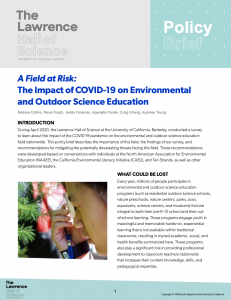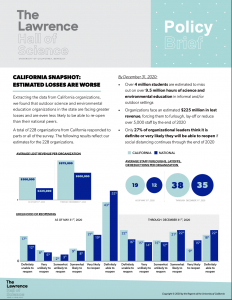By Robert Sanders | UC Berkeley Media Relations | rlsanders@berkeley.edu
June 10, 2020
Berkeley – The COVID-19 pandemic threatens the survival of organizations nationwide that provide critical outdoor environmental and science education to K-12 students, with an alarming 63% of such groups uncertain about their ability to ever reopen their doors, according to a study released this week by the Lawrence Hall of Science at the University of California, Berkeley.
By the end of May, the study’s authors estimated, some 4 million youth had missed the opportunity to engage in these programs. This number could rise to 11 million by December 2020 if these organizations are unable to reopen. The impact in California is even higher than nationally.
The loss of outdoor education is a devastating situation with potentially catastrophic impact, said Rena Dorph, director of the Lawrence Hall of Science (LHS), a science center and leader in developing K-12 science curricula. Getting youth outside, connecting with the world around them and learning about nature have many documented academic, health and social benefits, and most of outdoor education is conducted by residential outdoor science schools, nature centers, parks and zoos, not in traditional classrooms.
“This is happening at a time when public health leaders are promoting the value of outdoor learning as safe, engaging, effective and essential,” Dorph said. “The outdoors is a resource for learning, engagement and health, and it should be available to all.”
The loss will be felt disproportionately by historically marginalized groups, particularly students of color and students from low-income families, that are most likely to lose environmental education within their local school districts.
“Years of efforts to increase access to the benefits of learning and thriving in the outdoors could be undone, even if environmental and outdoor science education programs manage to reopen,” said Craig Strang, LHS associate director. “Resource-strapped organizations tell us they will need to forego initiatives to promote equitable and inclusive workplaces, and even perhaps to halt subsidized programming, scholarships, fee waivers, transportation grants and community partnerships in favor of paying customers, which could lead, once again, to the exclusion of low-income students and students of color. There are things we can do now to prevent that.”
The national survey of environmental and outdoor science education organizations was funded by the National Science Foundation and conducted in partnership with the California Environmental Literacy Initiative, the North American Association for Environmental Education and Ten Strands – organizations that focus on bringing environmental education to all K-12 students.
The study authors received nearly 1,000 responses from 49 states and the District of Columbia, with the majority of respondents coming from nonprofit organizations (62%) and/or public/governmental organizations (35%). Such programs serve a wide range of learners in areas including science, environmental literacy, conservation, youth development, community building, social emotional learning, career and job skill development, and environmental justice.
In the policy brief , the authors estimated that by Dec. 31, 2020:
- Some 11 million kids who would have been served by 1,000 organizations will have missed environmental and outdoor science learning opportunities. About 60% of them are from communities of color or low-income communities.
- The 1,000 organizations surveyed will have lost about $600 million in revenue.
- About 30,000 employees will have been laid off or furloughed from these organizations.
- It is highly likely that 37% of these organizations in California and 30% nationally will not reopen.
- Over one-third of the outdoor education field – up to 65% – will likely have disappeared, eroding a key component of the nation’s education infrastructure.
The policy brief suggests ways to mitigate the potential losses through funding priorities and intentional coordination of efforts with local and state education agencies. The ideas include redeploying outdoor educators to work in K-12 school settings to increase the capacity of the schools to educate students, while following social distancing guidelines. Such partnership arrangements could expand the space limits of schools and help them achieve learning goals, while allowing parents to return to work and providing educational, health and social benefits to students.
The authors also suggest that financial aid be preferentially allocated to efforts in marginalized communities to prevent the loss of gains made toward broadening participation in the field and achieving greater equity, inclusion, cultural relevance and social justice.
“Outdoor science and environmental learning organizations are an essential part of the education system,” Strang said. “They offer solutions to challenges the schools are currently facing as a result of the COVID-19 pandemic and need to be considered as key partners in developing funding priorities, health policies and guidelines for opening schools and delivering educational programming. It is our hope that this policy brief will help inform these decisions, while underscoring the importance outdoor learning plays in meeting educational and societal goals.”
RELATED INFORMATION
- A Field at Risk: The Impact of COVID-19 on Environmental and Outdoor Science Education (PDF)
- California snapshot: estimated losses are worse (PDF)
CONTACTS
Craig Strang, cstrang@berkeley.edu, (510) 882-6560
Susan Gregory, Deputy Director, Lawrence Hall of Science: sgregory@berkeley.edu, (510) 326-2590
Related Media Coverage
This study has been picked up many regional and national news outlets. See below for a growing list of related articles and coverage.
“A California Collective Makes the Case for Outdoor Learning”
PBS Newshour Weekend, August 3, 2020
Journalist Christopher Booker interviews Craig Strang (Lawrence Hall of Science) and Sharon Danks (Green Schoolyards America) about the time-tested strategy of bringing class outside. The interview sheds light on the work of the National COVID-19 Outdoor Learning Initiative and the resources that are available to help education leaders safely reopen in-person class by utilizing the outdoors.
COVID-19 Could Close Three Fourths of California’s Outdoor Science Education Programs
‘Fighting For Survival’: Outdoor Educations Programs at Risk Because of COVID-19
“Leading with equity to support our most vulnerable students”
Multibriefs, July 20, 2020
Author Sheilamary Koch focuses on equity in her second article for Multbriefs about reopening schools. She interviewed our team members, Craig Strang from the Lawrence Hall of Science and Vanessa Carter from San Francisco Unified School District for their insights.
Outdoor Classrooms Could Improve Student Mental Health
Pandemic Could Decimate Outdoor Environmental, Science Education Programs
Regional: California Districts Attempt to Revive Outdoor Education Programs Slashed During Pandemic
“Will COVID-19 Spell the End of Outdoor and Environmental Education?”
Smithsonian Magazine, July 13, 2020
Author Drew Higgins reviews the recent national policy brief by the Lawrence Hall of Science on the impact of COVID-19 on environmental and outdoor science education programs. He then interviews leaders from this community who are supporting the reopening of schools with their programs and expertise working with students outdoors.
“Why Can’t We Have Class Outside? It might be the answer to America’s school-reopening problem.”
The Atlantic, July 28, 2020
Journalist Olga Kazan explores the inequities that are occurring as families struggle with virtual learning. Kazan takes an in-depth look at what it would take to move class outside in the fall. Our team members, Vanessa Carter from San Francisco Unified School District and Green Schoolyards America’s Sharon Danks were interviewed for this piece.
“Why Outdoor Education May be the Key to Reopening Schools Safely”
Bioneers, July 10, 2020
Senior Director of Programs and Research at Bioneers Teo Grossman interviews Sharon Danks from Green Schoolyards America and Craig Strang from the Lawrence Hall of Science about the National COVID-19 Outdoor Learning Initiative they’re leading with the San Mateo County Office of Education and Ten Strands.
“Why Some Black and Latinx Families Lose Access to Nature During Pandemic”
KCRW Greater LA, June 10, 2020
In this podcast and accompanying article, journalist Steve Chiotakis interviews Los Angeles area parents, educators, and nonprofits about the dramatic decrease in children’s access to nature during the pandemic. Our team member, Craig Strang (Lawrence Hall of Science), shares data from a new survey by UC Berkeley about COVID-19’s impact on the viability of the nature and outdoor education sector.


